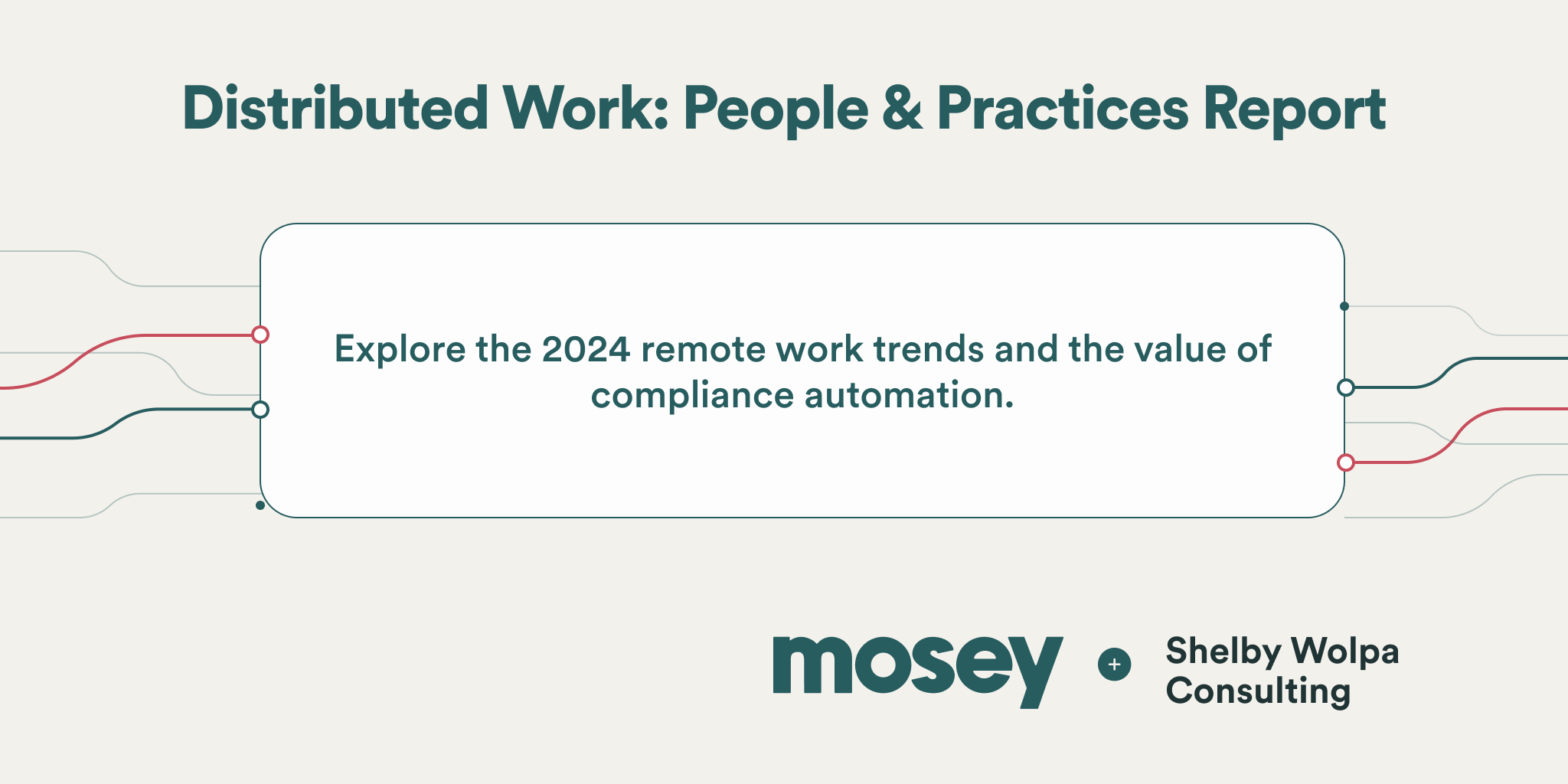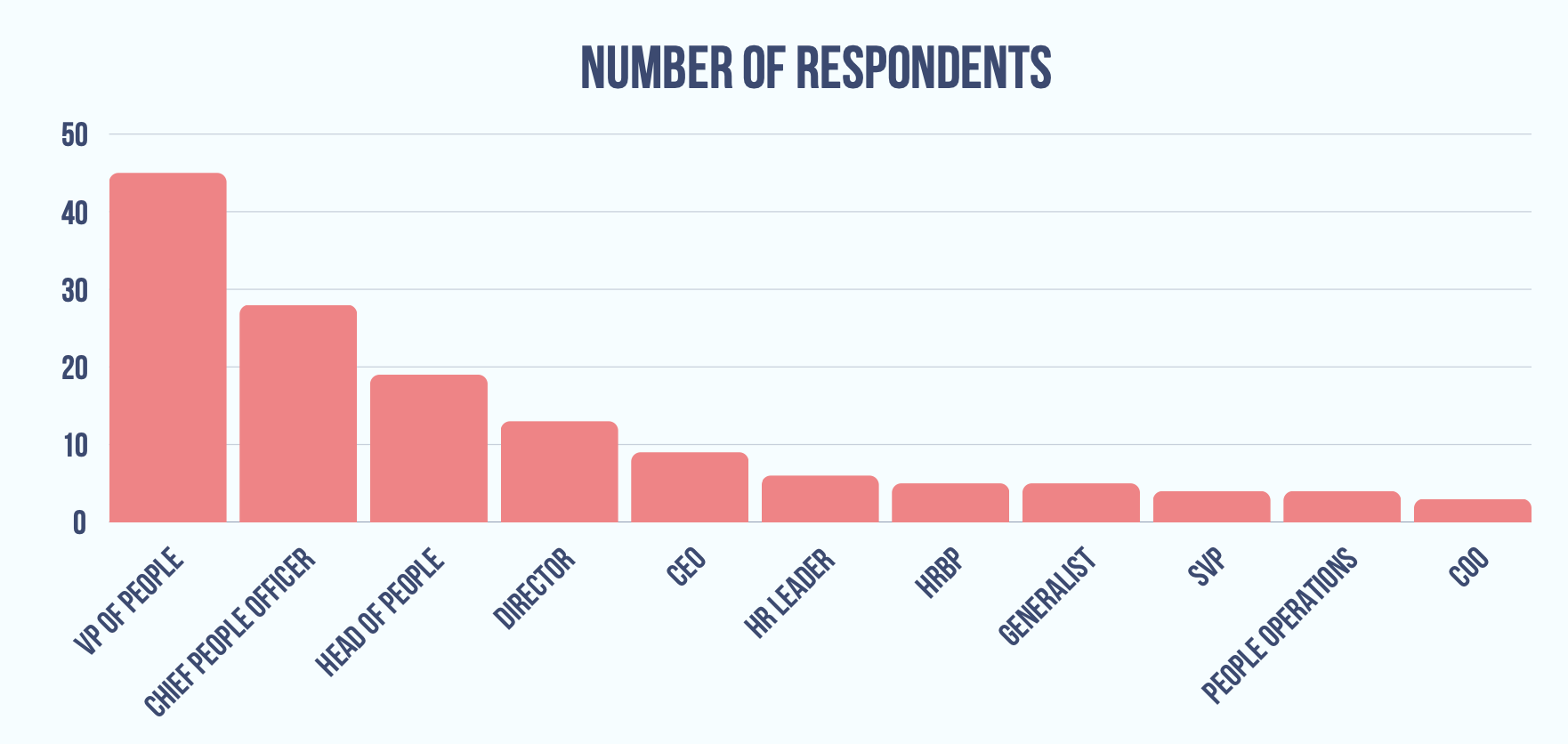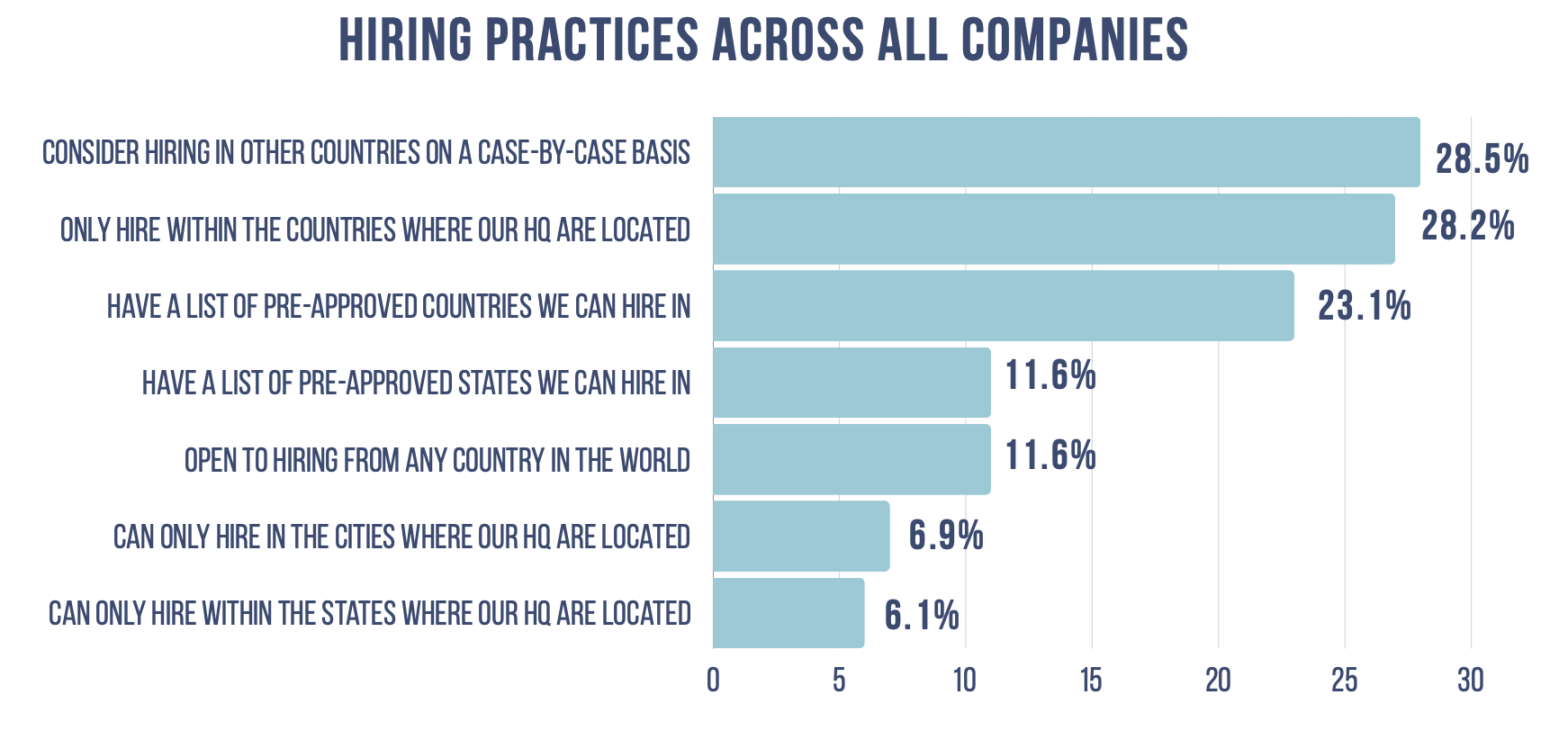
Distributed teams are no longer the minority and remote work trends are not only drawing more attention, but they are showing some interesting and valuable insights.
Mosey sponsored The Distributed Work: People & Practices report by Shelby Wolpa Consulting. As more businesses continue to adopt a distributed work style, understanding related compliance challenges and needs is instrumental to their success.
We invite all businesses with remote or hybrid teams to take a look at the report findings for yourself. Let’s dive into some of the most interesting findings in remote work trends and compliance needs.
The Distributed Work: People & Practices Report
Whether you are a seasoned remote team or thinking of starting a remote company, the findings in this report will prove useful to you.
The report is derived from data collected from 277 companies that shared their company practices in responses collected in February 2024. While there was a wide distribution of industries represented, respondents primarily consisted of small and medium-sized SaaS companies, FinTech businesses, and Professional Services companies.
From these companies, insights were gathered from mostly their people leaders – Head of People, Chief People Officer, VP of People. Almost 100% of the teams practice either fully remote or hybrid models, with a nearly 50:50 percent split.

Significance for Remote Teams
Remote work trends are clearly showing that remote work is growing in ever greater strides. Four times as many companies are expanding their remote work offerings in 2024 compared to those reducing remote work. Not only are more teams adopting a remote or hybrid approach, but those already implementing remote work are doubling down.
To further support the case for remote teams, 75% of companies indicated they will be maintaining or increasing their current level of flexible work arrangements, making these “new ways of working” the new normal.
Of those companies with existing remote or hybrid work models, 85% plan to either maintain or increase remote roles offered within the next five years.
What does this mean for hiring? If you’re an employee looking for a more flexible role, remote work trends are showing in your favor.
Enabling Hiring Practices
Hiring remote teams is not a new phenomenon, but some of its benefits are becoming more widely recognized as industry best practices.
Location-based hiring has previously been the norm for most companies. With the rise of remote work, more and more HR teams are adopting strategies for remote work. But today, only 12% of companies reported the ability to hire globally without restrictions. So, most businesses are still bound by some level of location-based approvals.
Hybrid Hiring Constraints
Remote and hybrid hiring practices are not the same. Hybrid models, in particular, tend to face more constraints due to the nature of being in-office part-time. HR teams of hybrid companies tend to need to hire only where their company has an office location to support this.
Fully remote companies are much more likely to have the ability to hire from anywhere, and, thus, are also more likely to hire in multiple states. Overall, there are more hiring constraints when employing the hybrid model than in the remote model.

How Hiring Remote Impacts Compliance
Adapting hiring practices to include remote employees expands the potential talent pool and can be the key to unlocking greater success for your business. The remote work model enables you to find the best talent anywhere in the country, or world, to bring onto your team.
One-third of respondents are location agnostic, and ignore geography when determining pay. This brings salary transparency laws and best practices to the forefront of considerations for remote hiring policies to ensure not only compliant, but equitable salary determinations.
Expanding hiring practices beyond your locality can introduce new compliance challenges. Mosey streamlines the compliance process for ease of management whether you’re in 4 cities or 24 states. Our partnerships with companies like Remote and Deel are enabling international businesses to tap into the US talent pool.
Whether you’re ready to bring on your first remote hire or looking to adopt a better compliance management strategy for your fully distributed team, Mosey has the tools and expertise to make it happen.
Remote Work Compliance and Trends
Companies are redefining what it means to be successful with remote work models. With a distributed team comes more flexibility, but also more complex compliance management.
Here are the most interesting remote work trends and compliance statistics that every business with remote employees should be paying attention to.
Compliance Statistics and Its Importance for Remote Work
Business compliance may sound tedious and boring, but don’t discount how vitally necessary it is for your business.
Most notably, less than 4% of companies utilize compliance support through outside resources and tools.
With a remote team, your company’s compliance needs will grow as well. The findings from the report reinforce that compliance is a universal time-suck. 61% of businesses spend more than $10,000 per year on compliance and 100+ hours of people time. Imagine all the time and money you could save by utilizing a tool like Mosey.
With varying legislation across the US, companies are also faced with the question of whether to adopt location-specific or company-generic HR policies, labor laws, and paid leave programs.
10 Remote Work Trends to Focus On In 2024
As we’ve mentioned, remote work is trending upward. More and more companies are implementing it into their hiring practices and navigating the complexities of compliance with a distributed workforce.
Here are the top 10 remote work trends of 2024 from the report findings:
- 85% of companies plan to either maintain or increase remote roles offered within the next five years.
- 66% of companies do not adjust compensation for relocations due to personal reasons.
- Nearly half (49%) of companies are expanding their mental health service offerings.
- 24% of hybrid or remote companies are expanding their leave policies.
- We are seeing a rise of remote work stipends offered to employees.
- While distributed work is the norm, in-person gatherings remain mission critical to success. Most companies (61%) convene on a regular basis in person, doing so at least annually.
- Over 60% of businesses spend more than $10,000 per year on compliance and 100+ hours of people time.
- Only 3.6% of respondents use a software for compliance support to save time and money.
- Across all customers surveyed, 27% didn’t know how much time they spent on compliance, rising to 48% for enterprise scale (1,000+ employees). This implies that there’s lots of hidden cost for teams when it comes to managing compliance.
- Some smaller businesses (25-50 employees) are spending $100,000-200,000 a year on compliance, implying a spend of $2,000-4,000 per employee per year.
Interested in diving deeper into the remote work trends and statistics shared? Download the full report here.
Solutions for Compliance Management
If it wasn’t clear already, compliance management for remote teams can be a beast! Empower your team and automate compliance management with tools like Mosey.
In categories like payroll, HR, tax, and registration, there is a whole suite of requirements that vary by state and locality to pay attention to. Take into account a few of the following examples:
- Registered agent: Having a registered agent is required to foreign qualify in a state. You can use a physical business location in the state, a third party service provider, or Mosey as your registered agent.
- Payroll & Tax account registration: There are many tax types to consider and organize registration with the correct state or local agency. Withholding, unemployment insurance, sales, corporate tax, and franchise tax are just a handful of the ones out there. Determining tax nexus and registering for the right accounts is just the first step in remaining compliant.
- Foreign qualification: Foreign qualification entails registering your legal entity with the Secretary of State. If you are doing business in the state, foreign qualification might apply to you.
- Agency mail: Managing and resolving agency mail is another level of compliance. Mosey offers the ability to receive and resolve any state or local agency mail through your account. Update your mailing address to your designated Mosey mailroom address and manage your mail needs with ease across a distributed team.
Automate Compliance Management for Remote Teams with Mosey
It is no secret that remote work trends are continuing in favor of distributed workforces. Not only does hiring remotely open the talent pool, but it allows businesses to adopt and foster a more balanced workplace culture.
However, a distributed team introduces more challenges when it comes to staying compliant with multiple state and local regulations. If you have a remote team, your business can benefit from compliance automation software like Mosey.
Mosey provides the business compliance resources, expertise, and technical support in all areas of compliance – HR, tax, payroll, registration, and ongoing monitoring.
When choosing a solution for remote teams, you want something trusted and comprehensive. Save valuable time and money, and eliminate the need for expensive legal and accounting fees, with Mosey.
Compliance is not just a one-time task, it is an ongoing and ever-changing landscape. You need a partner that empowers your business to stay ahead of the curve. Ready to get started? Book a demo to speak with an expert at Mosey today.

